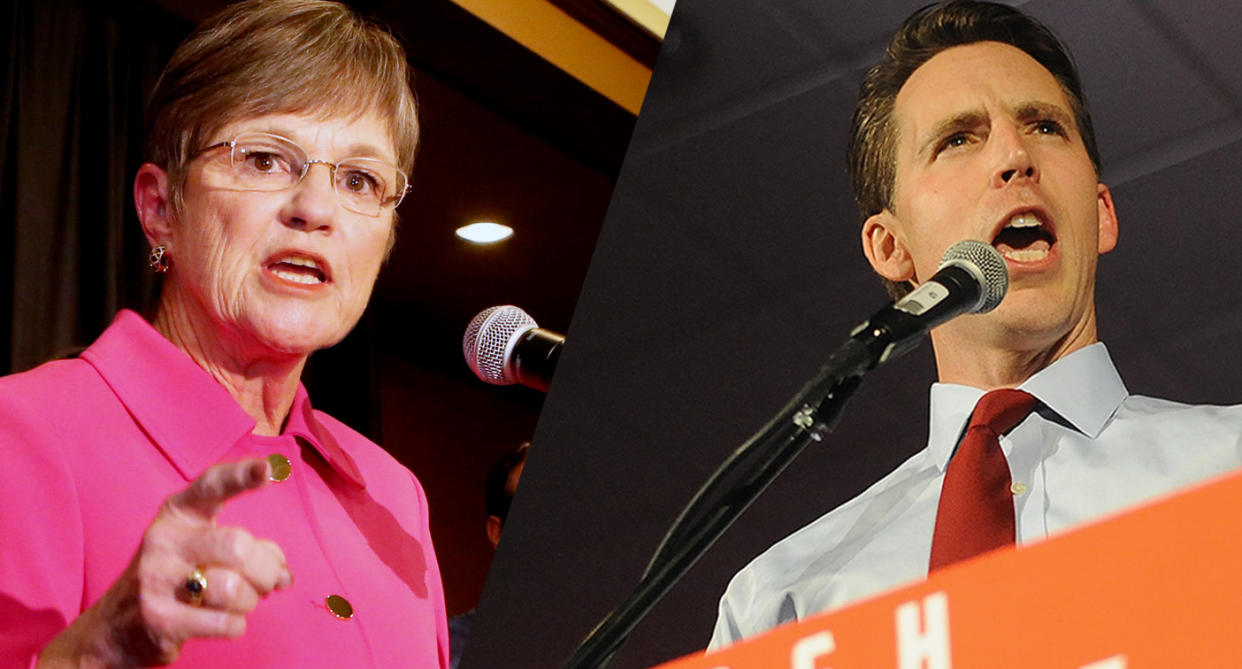Abortion rights activists celebrate wins in midterm elections

The abortion rights movement in the United States is finding much to celebrate in the midterm elections, though activists concede that victory is relative in this political landscape.
Describing the abortion access clock as “ticking close to midnight” with the confirmation of Justice Brett Kavanaugh to the Supreme Court last month, it has now ticked away, Planned Parenthood Action Fund’s executive vice president, Dawn Laguens, told Yahoo News after Tuesday night’s results: “Voters unequivocally shifted the hands of time.”
There were a few clear advances by anti-abortion forces on Election Day, specifically constitutional amendments passed by voters in Alabama and West Virginia. The Alabama version declared that fetuses have legal rights and that the state constitution does not include a right to abortion, while the West Virginia amendment says that “nothing in this Constitution secures or protects a right to abortion or the funding of abortion.” Both would effectively ban abortion in those states should the Supreme Court overturn Roe v. Wade. The votes were somewhat close, but clear — 58 percent voted in favor in Alabama and 52 percent did so in West Virginia.
In addition, anti-abortion senators flipped seats in Missouri, Indiana and North Dakota, and possibly added even more such senators in Arizona, Florida and Mississippi, where ballots are still being counted. This will likely mean that any anti-abortion President Trump judicial nominee will face no significant opposition in the Senate, though with the confirmation of Kavanaugh, abortion rights groups have already assumed that the court is unlikely to protect Roe v. Wade — making further anti-abortion justices less of a threat.

While notable, these were the only major victories by those who would limit abortion access. For those who would protect and expand it, Tuesday was a more wide-ranging night, particularly if the ground game is now focused on the states.
The flipping of the House of Representatives from Republicans to Democrats seems likely to mean that Congress will not be able to end federal funding of Planned Parenthood.
And at least one significant statewide initiative was defeated — an Oregon ballot measure that would have banned the use of public funds for most abortions was rejected by 64 percent.
On a victory lap conference call with reporters the morning after the election, Planned Parenthood officials said they count at least seven state legislatures — in Colorado, Connecticut, Maine, Minnesota, New York and both houses in New Hampshire — that are now “majority pro-choice.”
And the officials particularly stressed that the defeat of a number of staunchly anti-abortion gubernatorial candidates meant they would not be in place to sign anti-abortion laws that make it through the legislatures. In Kansas, for instance, the former governor of Kansas, Sam Brownback, signed more than 30 laws sharply restricting abortion access before he was named to an ambassadorship early this year. Staunchly anti-abortion Republican nominee Kris Kobach vowed to continue that policy, but was defeated by Laura Kelly, an outspoken abortion rights supporter who will now hold veto power.
Similarly, Wisconsin Gov. Scott Walker, who sharply cut Planned Parenthood Funding causing the closing of five clinics, and proposed a complete ban on abortion should the Supreme Court overturn Roe v. Wade, lost his reelection race to pro-choice Democrat Tony Evers.

There were similar defeats of anti-abortion gubernatorial candidates in Michigan, Minnesota, Nevada and Pennsylvania.
In all, a Planned Parenthood spokesman said, “We won more governors who are for reproductive health care than we have in 25 years.”
Medicaid expansion — in many ways a proxy vote for abortion access — was passed by voters in the conservative states of Utah, Nebraska and Idaho. Medicaid expansion was a central pledge of the victors of the governor races in Maine and Wisconsin.
“Far more elected officials today than yesterday are going to be working to protect access to abortion and reproductive health in this country,” Laguens said.
The reshuffling of the chessboard was a hard fought and expensive one. The anti-abortion group Susan B. Anthony List is said to have spent nearly $30 million in the midterm elections to support anti-abortion senate candidates, while the Planned Parenthood Action Fund spent $20 million to mobilize and advertise in the gubernatorial and Senate races in Arizona, Florida, Michigan, Minnesota, Nevada, Ohio, Pennsylvania and Wisconsin.
The results are potentially evidence of a changing view of abortion among voters. A Pew poll in the lead-up to Election Day found that 61 percent of Democratic voters say abortion is critically important to their vote, compared with 38 percent who said the same in 2008. Similarly, a PRRI survey found that more than half of Democrats (47 percent) describe abortion as a critically important issue to them, compared with just 40 percent of Republicans (40 percent). This is a sharp reversal of decades of data showing Republicans were far more likely to base their vote on the issue.
_____
Read more from Yahoo News:
The CIA’s communications suffered a catastrophic compromise. It started in Iran.
Ending the Qatar blockade might be the price Saudi Arabia pays for Khashoggi’s murder
How Robert Mercer’s hedge fund profits from Trump’s hard-line immigration stance
Trump’s target audience for migrant caravan scare tactics: Women
Photos: Deadly shooting at country dance bar in Thousand Oaks, Calf.


